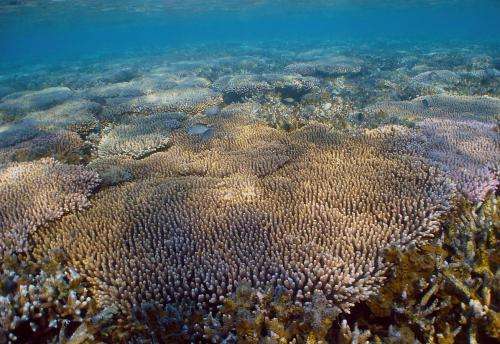In reef-building corals variations within genes involved in immunity and response to stress correlate to water temperature and clarity, finds a study published in BioMed Centrals open access journal BMC Genetics. Credit: Petra Lundgren, Juan C Vera, Lesa Peplow, Stephanie Manel and Madeleine JH van Oppen
In reef-building corals variations within genes involved in immunity and response to stress correlate to water temperature and clarity, finds a study published in BioMed Central's open access journal BMC Genetics. This information could be used to conserve or rebuild reefs in areas affected by climate change, by changes in extreme weather patterns, increasing sedimentation or altered land use.
A research team led by the Australian Institute of Marine Science, and in collaboration with Penn State University and the Aix-Marseille University, studied DNA variations (Single Nucleotide Polymorphisms, SNPs) across populations of reef corals found at a range of temperatures and water clarity along the Great Barrier Reef.
SNPs which correlated to water clarity and water temperature preferred by cauliflower coral were found in genes involved in providing immune response, and regulating stress-induced cell-death. This means that coral with a specific version of these genes tended to grow at higher temperatures (or water clarity) and another variant at lower. A similar story was found for staghorn coral - SNP in genes involved in detoxification, immune response, and defense against reactive oxygen damage, were found to be associated with temperature or to water clarity.
Dr Petra Lundgren, from The Australian Institute of Marine Science, explained, "Corals are particularly vulnerable to climate change. Not only is the temperature of the water they live in affected but extreme weather and higher rainfall leads to increased levels of sediment, agricultural runoff, and fresh water on the reef. This work opens up possibilities for us to enhance reef resilience and recovery from impacts of climate change and pollution. For example, if in the future we need to restore coral populations, we can make sure that we use the most robust strains of corals to do so."
More information: Genotype—environment correlations in corals from the Great Barrier Reef, Petra Lundgren, Juan C Vera, Lesa Peplow, Stephanie Manel and Madeleine JH van Oppen, BMC Genetics (in press)
Journal information: BMC Genetics
Provided by BioMed Central





















